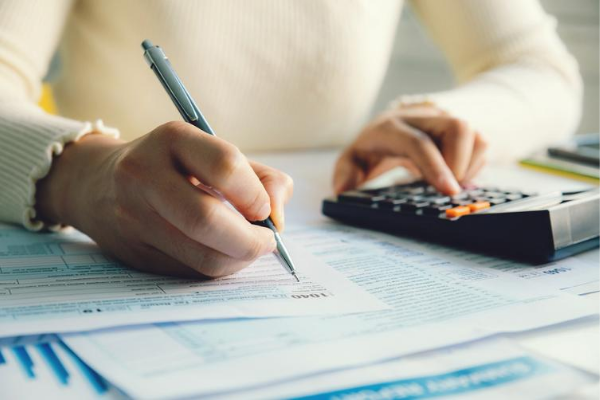Sian Meades-Williams, freelance writer and curator of Freelance Writing Jobs, solves the issues affecting all freelancers. This week – how to save for your taxes throughout the year.
Q: I really struggle to get into good habits with saving for my tax bill. Every April I tell myself it’s going to be different, but then my plans go off the rails pretty quickly and I always have to find a huge lump of cash at the end of January. How do I save for my taxes throughout the year?

Sian says: It seems particularly strange to talk about savings at a time when freelancing is so uncertain. We’re in the middle of lockdown in the UK and the government’s grants for the self-employed have just been announced. There’s a bit of a break, too: the next tax payment has been postponed until 31st January.
Despite all of this, saving for tax is still a pressing issue for every freelancer. Some of us will find saving easy, others will struggle, and that’s OK. It certainly doesn’t make you a bad freelancer.
It’s not music to anyone’s ears, but the easiest way to save for your tax bill is to know what you’re saving for. Do you tax return as soon as you can. It’ll give you a reassuring goal to save towards, rather than blindly guessing. You’ll also stop that tax return dread that washes over you around the same time you start your Christmas shopping.

If that feels too much too soon, then use this month to create a finance system that gives you a solid idea of what you’ll need to pay (not forgetting National Insurance and any payments to the Student Loans Company). I’ve got a nifty spreadsheet for this, but invoicing software such as Freshbooks will do this and you can upload those files straight into your Self Assessment instead of doing the sums manually.
It can be tempting to make the same payment into your savings account each month, but if your work fluctuates throughout the year your monthly installment doesn’t shift, you’re more likely to stop it entirely. Instead, the easiest way to approach your taxes is to save 20% of every single invoice payment that lands in your bank account. Yes, even that very little one.
It sounds so simple, so why isn’t it?
It’s easy for us to have good intentions. We might set up a dedicated savings account and deposit the correct amount of money into it each month, but then something throws a spanner in the works: a client is late in paying us, the washing machine breaks down, or a job gets postponed at the last minute. So we dip into our savings to tide us over. We intend to put the money back next month, but sometimes we don’t. Come the end of the year, we’re scrabbling for cash to meet the deadline.
Once you’re behind on your payments, it’s very hard to catch up and save for the next payment
The other reason freelancers are routinely caught short come January is payments on account. These ensure that you’re not paying your tax in arrears but if you’re not anticipating the extra 50% on top of your annual tax bill, they can be a real shock. In previous years I’ve struggled enormously when the payment on account has been larger than expected – you can’t just magic a couple of grand from nowhere. Once you’re behind on your payments, it’s very hard to catch up and save for the next payment.
Now I approach my savings in a way that works for me. I save very small amounts that I don’t notice leaving my account but add up to a substantial amount. I recommend setting up the smallest weekly standing order possible straight into your savings. A tenner a week adds up to over £500 a year – a huge chunk of your bill. I also use a “save the change” service (Lloyds has one, so does Monzo). This rounds up debit card payments to the nearest pound and deposits the change into your savings. It doesn’t sound like much, but a few pounds a day mounts up.

I also use the Plum app, which connects with my account and uses an algorithm to determine how much I can save every few days. My money grows in an account until I’m ready to use it. “Out of sight out of mind” is definitely a good thing for me.
The important thing is not to go six months without saving anything at all. Little and often is key, even when work is quiet. This is why whatever we save needs to be manageable for us every month. If it’s not, we’ll stop.
Your finances are a huge part of being self-employed, and tax payments shouldn’t ever be something that you ignore until the month they’re due. Just like meeting deadlines or brainstorming for new client pitches, taxes are part and parcel of being a successful freelancer. Find a way of saving that works for you, and tackle the issue head on. If you can do this, it’ll have a positive impact on your freelancing all year round.






